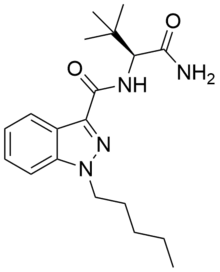ADB-PINACA
 | |
| Legal status | |
|---|---|
| Legal status |
|
| Identifiers | |
| |
| CAS Number | |
| PubChem CID | |
| ChemSpider | |
| Chemical and physical data | |
| Formula | C19H28N4O2 |
| Molar mass | 344.51 g/mol |
| 3D model (JSmol) | |
| |
| |
ADB-PINACA is a cannabinoid designer drug that is an ingredient in some synthetic cannabis products. It is a potent agonist of the CB1 receptor and CB2 receptor with EC50 values of 0.52 nM and 0.88 nM respectively.[1][2] Like MDMB-FUBINACA, this compound contains an amino acid residue of tert-leucine.
Side effects
ADB-PINACA has been linked to multiple hospitalizations and deaths due to its use.[3][4][5]
Legality
ADB-PINACA is listed in the Fifth Schedule of the Misuse of Drugs Act (MDA) and therefore illegal in Singapore as of May 2015.[6]
In the United States, it is a Schedule I controlled substance.[7]
As of October 2015 ADB-PINACA is a controlled substance in China.[8]
See also
References
- ↑ Samuel D Banister; Michael Moir; Jordyn Stuart; Richard C Kevin; Katie E Wood; Mitchell Longworth; Shane M Wilkinson; Corinne Beinat; Alxendra S Buchanan; Michelle Glass; Mark Connor; Iain S McGregor; Michael Kassiou (July 2015). "The pharmacology of indole and indazole synthetic cannabinoid designer drugs AB-FUBINACA, ADB-FUBINACA, AB-PINACA, ADB-PINACA, 5F-AB-PINACA, 5F-ADB-PINACA, ADBICA and 5F-ADBICA". ACS Chemical Neuroscience. 6: 1546–59. PMID 26134475. doi:10.1021/acschemneuro.5b00112.
- ↑ "ADB-PINACA". Forendex.
- ↑ "CDC: 221 sickened by synthetic pot in Colorado". USA Today. December 12, 2013.
- ↑ Michael D. Schwartz; et al. (March 2015). "A Common Source Outbreak of Severe Delirium Associated with Exposure to the Novel Synthetic Cannabinoid ADB-PINACA". Journal of Emergency Medicine. 48 (5): 573–580. PMID 25726258. doi:10.1016/j.jemermed.2014.12.038.
- ↑ Jordan Trecki; Roy R. Gerona; Michael D. Schwartz (July 2015). "Synthetic Cannabinoid–Related Illnesses and Deaths". New England Journal of Medicine. 373 (2): 103–107. PMID 26154784. doi:10.1056/NEJMp1505328.
- ↑ "CNB NEWS RELEASE". Central Narcotics Bureau (CNB). 30 April 2015. Retrieved 24 July 2015.
- ↑ "Schedules of controlled substances: temporary placement of four synthetic cannabinoids into Schedule I. Final order". Fed Regist. 79 (27): 7577–7582. Feb 10, 2014. PMID 24605391.
- ↑ "关于印发《非药用类麻醉药品和精神药品列管办法》的通知" (in Chinese). China Food and Drug Administration. 27 September 2015. Retrieved 1 October 2015.
This article is issued from
Wikipedia.
The text is licensed under Creative Commons - Attribution - Sharealike.
Additional terms may apply for the media files.